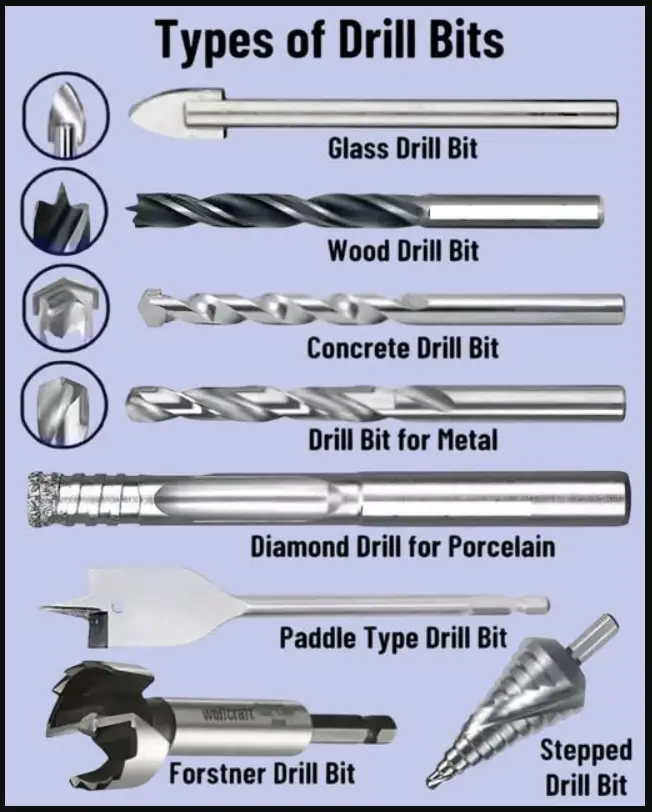Drill bits are cutting tools used to create cylindrical holes in various materials like wood, metal, concrete, and masonry. The type of drill bit you choose depends on the material and the hole size needed. Here’s a breakdown of the most common drill bit types and their uses:

1. Twist Drill Bits
-
Material: High-speed steel (HSS), cobalt, or carbide-tipped.
-
Uses: General-purpose drilling in wood, metal, and plastic.
-
Variations:
-
HSS Bits: Standard for metal and wood.
-
Cobalt Bits: Harder, for stainless steel and tough metals.
-
Carbide-Tipped Bits: For abrasive materials.
-
2. Masonry Drill Bits
-
Material: Tungsten carbide tip.
-
Uses: Drilling into brick, concrete, stone, and block.
-
Notes: Requires hammer drill mode for best results.
3. Spade (Paddle) Bits
-
Material: HSS or carbon steel.
-
Uses: Fast, rough drilling of large holes in wood.
-
Features: Flat, paddle-like shape with a centering point.
4. Forstner Bits
-
Material: HSS or carbide.
-
Uses: Precision flat-bottom holes in wood (e.g., cabinetry, hinges).
-
Advantages: Clean cuts with minimal tear-out.
5. Hole Saw Bits
-
Material: Bi-metal (HSS teeth) or carbide-tipped.
-
Uses: Cutting large-diameter holes (1–6 inches) in wood, metal, plastic.
-
Common Uses: Door locks, pipes, and electrical fittings.
6. Auger Bits
-
Material: Carbon steel or HSS.
-
Uses: Deep, clean holes in wood (e.g., timber framing, fencing).
-
Features: Screw-like tip for self-feeding.
7. Step Drill Bits
-
Material: HSS or titanium-coated.
-
Uses: Drilling multiple hole sizes in thin metal, plastic, or sheet metal.
-
Advantages: Graduated steps eliminate bit changes.
8. Countersink Bits
-
Material: HSS or carbide.
-
Uses: Creating a conical recess for screw heads (woodworking/metalworking).
-
Often Paired With: Pilot hole bits.
9. Tile/Glass Drill Bits
-
Material: Carbide or diamond-coated tip.
-
Uses: Drilling ceramic, porcelain, glass, and tiles.
-
Tip: Use low speed and water cooling to prevent cracking.
10. SDS (Slotted Drive System) Bits
-
Material: Carbide-tipped.
-
Uses: Heavy-duty hammer drilling in concrete and masonry.
-
Note: Requires an SDS-compatible drill.
11. Self-Feed (Wood Boring) Bits
-
Material: HSS.
-
Uses: Fast drilling of large holes in wood (e.g., construction, plumbing).
-
Design: Sharp tip with threaded screw for self-pulling.
12. Center Drill Bits
-
Material: HSS.
-
Uses: Creating starter holes for lathe work or precise metal drilling.
Choosing the Right Drill Bit:
-
Wood: Twist, spade, auger, Forstner.
-
Metal: HSS, cobalt, step drill.
-
Masonry/Concrete: Masonry, SDS.
-
Tile/Glass: Carbide or diamond bits.
-
Large Holes: Hole saw, auger, self-feed.
Using the correct bit ensures efficiency, precision, and bit longevity. Always match the bit to the material and use appropriate drilling speed/cooling (e.g., water for tile, cutting oil for metal).
